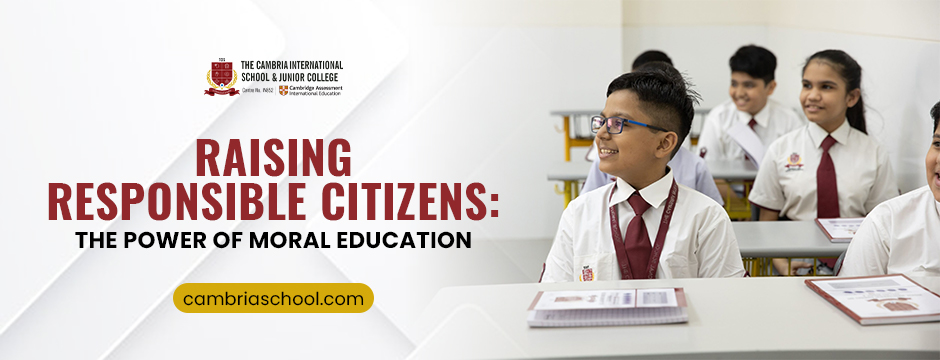Raising Responsible Citizens: The Power of Moral Education
In an increasingly complex world, raising responsible citizens has become both a necessity and a challenge. Children today are exposed to a fast-changing digital environment, diverse cultures, and rapidly shifting social norms. While academic excellence remains important, it is no longer the sole measure of a child’s potential. What truly shapes their character—and ultimately the society we live in—is moral education. It provides the foundation for values such as empathy, honesty, fairness, and respect, helping children grow into ethical individuals capable of contributing positively to their communities.
Moral education at schools in kalyan west not only guides children in distinguishing right from wrong but also strengthens their emotional intelligence, decision-making abilities, and interpersonal skills. It empowers them to navigate peer pressure, societal expectations, and ethical dilemmas with confidence and clarity. More importantly, moral education cultivates a sense of responsibility toward others and the environment, preparing children to become future leaders with integrity and compassion.

The Importance of Moral Education in Early Development
Moral education lays the cornerstone of a child’s personality. Values taught during early childhood often influence their behaviour, attitudes, and decision-making skills later in life. When children understand concepts like fairness or kindness at a young age, they carry these principles into adolescence and adulthood. Early moral education also helps create emotionally stable children who respect others’ perspectives and maintain healthy relationships.
Moreover, when moral values become integrated into daily routines—such as sharing toys, resolving conflicts peacefully, or telling the truth—children learn through real-life examples rather than mere instruction. This experiential learning ensures long-lasting and meaningful impact.
Building Empathy and Emotional Intelligence
One of the greatest benefits of moral education is the development of empathy. Children who understand the feelings of others tend to be more compassionate, cooperative, and supportive. Empathy reduces bullying, encourages teamwork, and fosters emotional resilience.
Emotional intelligence teaches children to manage their emotions, recognise others’ emotions, and respond thoughtfully. These skills are indispensable as they help children communicate effectively, build trust, and adapt to social environments. A morally grounded child is not just well-behaved; they are emotionally aware and socially responsible.
Enhancing Decision-Making and Critical Thinking
A strong moral foundation by the Schools in Kalyan West helps children make better choices when faced with challenges or temptations. Instead of relying solely on rules, they learn to assess situations based on values such as honesty, responsibility, and respect. This nurtures critical thinking, as children begin to evaluate the consequences of their actions.
Moral education also promotes accountability. When children understand why certain behaviours are right or wrong, they take ownership of their actions. They become more willing to admit mistakes and learn from them, which is a crucial element of responsible citizenship.
Creating a Respectful and Inclusive Society
Children who receive consistent moral education are more likely to embrace diversity and treat others with respect. Values like tolerance, equality, and kindness help them build bridges across cultural, social, and economic differences. In today’s global community, such traits are essential for creating a peaceful and harmonious society.
By teaching acceptance early on, schools and parents can prevent prejudice and discrimination. Children learn to appreciate differences, celebrate individual strengths, and stand up against injustice—qualities needed for a more inclusive future.
The Role of Parents and Educators in Moral Development
Both parents and educators play equally crucial roles in shaping a child’s moral character. Children learn more from what adults do than what they say. When parents display honesty, empathy, and responsibility, children naturally emulate these behaviours.
Educators reinforce these values through structured activities, classroom interactions, and real-world examples. Schools that integrate moral education alongside academics create environments where children feel safe, respected, and motivated to behave responsibly. Consistency between home and school ensures that values are not just taught but lived.
Practical Ways to Instil Moral Values in Children
Storytelling with Meaning
Stories with moral lessons spark imagination while subtly teaching values like courage, kindness, and perseverance.
Encouraging Community Participation
Activities such as volunteering, participating in community clean-ups, or helping others instil a sense of social responsibility.
Modeling Good Behavior
Children at Schools near kalyan west and the mirror adults. Demonstrating respect, patience, and fairness has a greater impact than lectures.

Creating a Value-Rich Environment
Displaying quotes, engaging in discussions, and celebrating acts of kindness reinforce values daily.
Open Communication
Allowing children to express their feelings and concerns helps them develop honesty and confidence.
Moral Education as the Foundation of Responsible Citizenship
Responsible citizens are not created overnight—they are shaped through consistent exposure to good values, supportive environments, and positive role models. Moral education equips children with the integrity and courage needed to participate actively in society. From standing up for what is right to showing compassion toward the vulnerable, these qualities form the backbone of a strong, ethical community.
When children grow with a strong moral foundation, they not only excel academically but also thrive emotionally and socially. They become individuals who understand the impact of their actions and strive to make the world a better place.
End Notes
Moral education is one of the most powerful tools we have for raising responsible citizens. It nurtures empathy, promotes ethical decision-making, strengthens emotional intelligence, and fosters respect for others. When parents and Schools in Kalyan West work together to support value-based learning, children develop into thoughtful, responsible, and compassionate individuals.
For parents seeking a school that blends academic excellence with strong moral development, The Cambria International School stands out as an inspiring choice. With its holistic approach, nurturing environment, and commitment to shaping future leaders with integrity, it offers the ideal foundation for raising responsible citizens.

